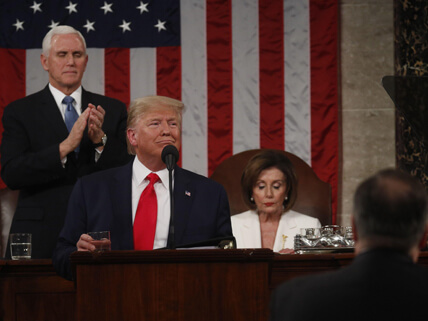President Trump delivers the State of the Union address, February 5, 2020—with Vice President Pence and Speaker of the House Pelosi behind him—the night before the Senate impeachment vote.
The United States Senate voted to acquit President Donald John Trump of the two articles of impeachment leveled against him by the Democrat-controlled House of Representatives. Thus ended only the third trial of a president in U.S. history. The outcome was hardly a surprise. To most political observers, the outcome was never in doubt. To remove a president from office requires a two-thirds supermajority. This would have meant 20 Republicans, who hold a majority in the Senate, voting against the president of their own party.
On December 18, upon completion of their impeachment inquiry, House Democrats adopted two impeachment articles. The first article charged President Trump with abusing the power of his office by withholding $391 million in military aid to Ukraine in order to pressure that country’s president to pursue investigations for Trump’s personal political benefit. The second article charged the president with obstructing Congress’s investigation of the matter. Speaker of the House Nancy Pelosi then held on to the articles of impeachment for nearly a month, finally sending them to the Senate on January 15. Arguments by the Democratic House “managers” (lawyers for the “prosecution”) began the next day. They were followed by the defense presented by the president’s lawyers. Senators, acting as the jury, had to remain silent. Chief Justice of the United States John Roberts presided. Senators were permitted to submit questions in writing to the Chief Justice, who then posed them to the lawyers.
One dramatic turn in the trial arose over whether to call additional witnesses. The motion was defeated in a close vote. This ended speculation that Trump’s former national security adviser John Bolton or others such as Joe or Hunter Biden might be called to testify. The two impeachment articles were then defeated on strict party-line votes—with the one exception that Republican Senator Mitt Romney voted with the Democrats for the president’s removal on the “abuse of power” charge. President Trump’s acquittal rested primarily on Republicans’ position that what the president did with regard to Ukraine did not rise to the level of an “impeachable offense.” Whether Trump should be removed from office, they also argued, should be left to the American people in the November 2020 election.
Image credit: © REUTERS/Leah Millis/POOL/UPI/Alamy
Related Links:
- In Historic Vote, Trump Acquitted of Impeachment Charges
Summary of the final votes in the impeachment trial of President Donald Trump.
(Source: Washington Post, February 5, 2020) - Trump Impeachment Trial Begins as Chief Justice Roberts, Senators Sworn In
This article captures the historic formal opening of the impeachment trial of President Donald Trump; includes photos and videos.
(Source: ABC News, January 16, 2020) - 10 Takeaways from President Trump’s Impeachment Trial
Weighing the impact of the impeachment trial on the future of American politics.
(Source: Associated Press, February 5, 2020) - What Trump’s Acquittal Means for the Rule of Law
Conservative assessment of the significance of and fallout from President Trump’s acquittal.
(Source: National Review, February 5, 2020)




